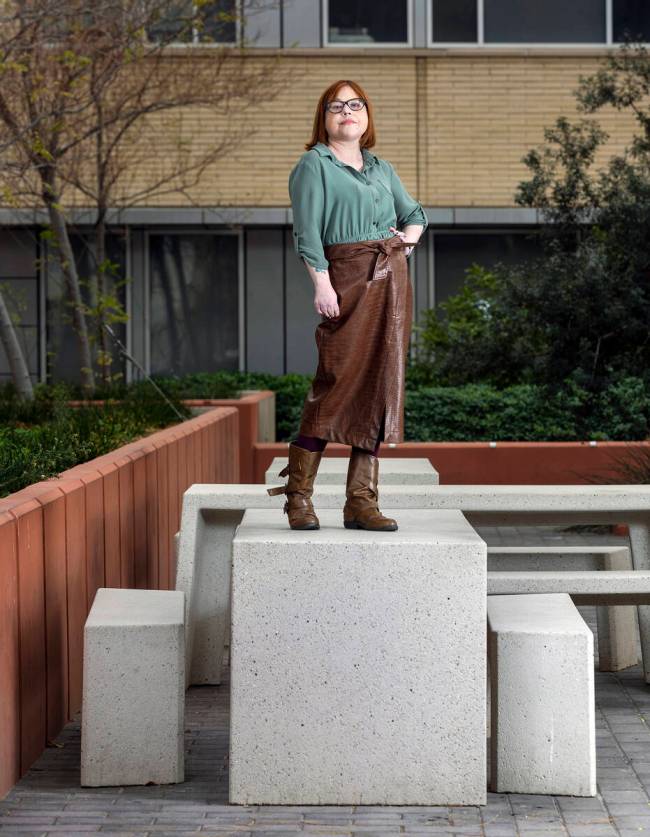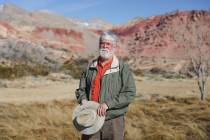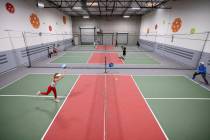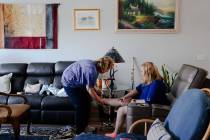Pain and Peace: A lifetime of illness — and the forging of a fighter
I was in my therapist’s office enduring another mother-daughter session. Then my mother yelled, “I just want to have a peaceful life!” I was the unspoken conflict in the way of her peace. My therapist calmly responded, “I think we all want a peaceful life.”
That thought silenced me. Was there something inherently wrong with me? Am I no good for the people around me? Am I the one who ruins everything because I can’t settle myself? I’m loud and take up room wherever I am, sometimes with my mobility scooter, or my medical needs, or my personality. What if peace is not only something I can’t have because of my health but because I am wired wrong?
What is a peaceful life? Living your whims without responsibility? Sitting in the same rocking chair every night in front of a fire with your partner and recounting the good old days?
I didn’t think this was possible for me. Living to old age was an absurd, unthinkable thought for me. All 13 of my doctors would tell you so. 
I came into this world true to my home state’s motto, “Battle Born.” I was born a full-term happy, bouncing baby with multiple chronic health issues and birth defects. I was born with a form of polycystic kidney disease, a hole in my heart, no soft spot on my skull, and malrotated bowels, among other things that went undiagnosed.
My mother explains the first week of my life: “A new doctor coming into my hospital room every day to tell me something else was wrong with my child.” I wasn’t supposed to make it past a month.
While I made it far past a month old, my childhood was filled with doctors, hospitals, and chronic pain. There were also plenty of birthday parties, friends, sleepovers and afternoons on the playground. Inevitably those things would be ruined by chronic pain, another surgery, or illness.
My chronic pain often ended playdates prematurely, leaving me standing by the front door, holding my stomach as my friends left hours earlier than they should have. I remember the taste of liquid cherry Tylenol as I gagged it down to stop the pain, which it rarely did. I remember knowing that no matter how good things were going or how stable my health was, it would eventually ruin the little normalcy I had.
But amid the hospital stays and chronic pain, I learned to toughen up and survive. I got to be known as an optimist and a fighter among my family, friends, and medical professionals. I learned to grin and bear pain enough to go to school without anyone knowing something was wrong. I kept my pain to myself and toughed it out until I was in a fit of tears, screaming to go to the hospital. This backfired when I was in middle school. I waited so long to tell anyone I was sick that I lost my spleen and most of my pancreas. I was in the hospital for three months and nearly died.
Once admitted to the hospital, I would be laser-focused on life afterward, obsessed with anything I could do to get better faster. I was the hospital people-pleaser, and when things didn’t work out, I felt like a failure, and when you associate failure with sickness and death, failure feels like the worst thing that can happen. To say this approach was healthy would be a lie, but it did give me drive and determination, a fire inside me, a fight to live.
I had many obstacles going through school with disabilities. My mother went through many battles to get me the education I had the right to. Teachers would not allow me in their classes and refused to let me take college prep courses, saying they weren’t necessary. I was even told to take a test in a broom closet, Harry Potter-style.
Throughout my years of public school, I watched as my mom advocated for my rights. She taught me how to use my voice when I felt something wasn’t right. Shy and a people-pleaser — an inconvenient combination — I usually only advocated for myself when mom was nearby. It was hard to explain that I had rights when I knew people had already made up their minds about me.
The battles culminated in a victory: I graduated from Palo Verde High School in 2005. It was one of my proudest moments — I did it, I fought the educational system, I fought to stay alive. I’d almost died four times by the time I was 17, with roughly 20 surgeries. But graduation made me feel like a champion. I’d fought to stay alive so much that my fight, flight or freeze response, was stuck firmly on fight.
Before starting college when I was 21, I went through depression. But during that time away from school, I also lived life and found my voice. There was no trace of the shy schoolgirl anymore. I was an angry young woman who was done with being mistreated. I was also done with seeing others mistreated. I’d been told this: You either become the person who doesn’t want anyone to be hurt the way you were, or you become the person who thinks everyone should be hurt the way you were.
I joined causes that were meaningful to me, my biggest influences being the Jean Nidetch Women’s Center at UNLV and my women’s studies classes. I helped run Take Back the Night, an event intended to bring awareness and support to interpersonal violence.
In college, I had to continue to advocate for myself. Some teachers still discriminated against me due to my disabilities. When one psychology graduate assistant told me that using a notetaker was cheating, I knew that his attitude didn’t affect me alone — it affected the next disabled person with a notetaker or an even more complex accommodation.
One day I was in my boss’s office at my on-campus job explaining how a teacher blocked the access ramp to a building on campus. I was outraged, and I’d taken the issue up with the dean. When I was done telling my story, my boss turned around and exclaimed, “That was you?!”
Yes, it was me. And because I spoke up, I can happily report that I now freely use that ramp to get to my classes four days a week.
The ramp saga turned me into an advocate for disability rights. I look now at the things that happen to me and don’t want them to happen to anyone else. I deal with adversity because, in most of the spaces I inhabit, there wasn’t a person like me before me. If something’s not right, I have a responsibility to say so. I’m the first line of defense.
Peace was never mine. But, at least in part, that’s a choice I’ve made. I choose to put myself in the ring. I see my peace in the people I lead, the transplant patients I help, the disabled person who will be treated with respect.
Year after year, I will add to my list of medicines and surgeries. I will most likely die in a hospital bed and not in my sleep or hit by whatever bus seems to hit and kill people randomly. I am OK with that. I will die the same way I was born, part of the battle.◆
Jenny Stiles died on March 28, 2023, at age 35. She will be deeply missed by all of us who worked with her and witnessed her kindness, talent and determination.












